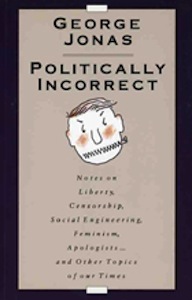 In Googling “Politically Incorrect” to find an image of Jonas’ book cover, I was reminded that television host and stand-up comedian Bill Maher at one time had a talk show of the same name. It was cancelled in 2002, in the wake of controversy generated by, surprise surprise, some politically incorrect comments Bill made about the 9/11 attacks. The irony of canceling a show called Politically Incorrect for remarks deemed politically incorrect was, evidently, lost on the producers and network, but controversy – often, but not always, followed by public apology – is the price we “politically incorrect” pay. Reading Jonas, watching Bill Maher, laughing without restraint or reservation at certain standup comics I adore and finding a majority of today’s sacred political and social assumptions ripe for mockery has led me to the uncomfortable conclusion that I, too, am “politically incorrect,” and that the only thing separating me from public scorn is the lack of a platform.
In Googling “Politically Incorrect” to find an image of Jonas’ book cover, I was reminded that television host and stand-up comedian Bill Maher at one time had a talk show of the same name. It was cancelled in 2002, in the wake of controversy generated by, surprise surprise, some politically incorrect comments Bill made about the 9/11 attacks. The irony of canceling a show called Politically Incorrect for remarks deemed politically incorrect was, evidently, lost on the producers and network, but controversy – often, but not always, followed by public apology – is the price we “politically incorrect” pay. Reading Jonas, watching Bill Maher, laughing without restraint or reservation at certain standup comics I adore and finding a majority of today’s sacred political and social assumptions ripe for mockery has led me to the uncomfortable conclusion that I, too, am “politically incorrect,” and that the only thing separating me from public scorn is the lack of a platform.
George Jonas has been at this business of provocation for some time now. He was born in Hungary in 1935, and stayed just long enough to have some haunting memories of both the Nazi and Soviet tyrannies before escaping to Canada in 1956. Here he established himself as a writer – of fiction, journalism, poetry, memoir – and he has been reliably provocative ever since. This book, one of only two collections of his journalism, is organized around “follies,” topics such as social engineering, censorship and feminism, and it’s probably another good indication that I am doomed to political incorrectness that I found myself laughing in agreement almost the whole way through this book. Here, for example, is his unfiltered opinion of feminism, provocative enough to be quoted on the back cover:
I strongly feel that three-quarters of everything militant feminists have been saying or writing in the last fifteen years ranges from the baseless to the base. I find most feminist ideas, at best, inaccurate as they pertain to history and human nature, and at worst, pernicious and spiritually obscene.
My only quibble with this paragraph is that it comes in the midst of a 500-word piece of journalism that can’t possibly confirm its clams. In writing to me, he is preaching to the converted, but the average National Post reader couldn’t be blamed for recoiling somewhat.
Jonas also happens to be an extremely witty writer. Any offense he gives is mitigated somewhat by the laughter he provokes with its delivery. In reply to that odious assertion that only a woman should be allowed to speak on issues of abortion and contraception, Jonas replies that he is not speaking as a man but “solely on my authority as an ex-fetus.” By pure coincidence, my writing of this post has overlapped with my reading of another witty Canadian contrarian, Mark Steyn, whose book America Alone deals with the threat of Islamic immigration to countries so castrated by multiculturalism that they cannot defend their own core values. Steyn would appreciate, as I do, Jonas’ stance on the issue, as well as the fatwa issued against Salman Rushdie:
It ought to be made unmistakably clear to all newcomers that this is not a country waiting to be remade in the image of other countries.
Canada has its own ideals and institutions, defended by blood in two world wars in this century. It is a secular, liberal democracy, governed by the rule of law. Newcomers are welcome to share it, but not to ruin it.
They can’t threaten us with violence or repression. They can’t start telling other Canadians what to say, think or read. They may come here from the Middle East or Asia, but they can’t bring the Middle East or Asia with them.
In calling for a government ban on Rushdie’s book, a Moslem spokesman was quoted as saying that his group intended “to act within the law first.” No sir. While you are in this country you will act within the law not only first but always. If you don’t, you’ll find that your first act outside the law has also been your last.
Comparing these words to the wheedling prostrations of the politically correct, many of whom blamed Rushdie for giving offense, lessens the blow of being called politically incorrect. Indeed, it makes it a badge of honor.